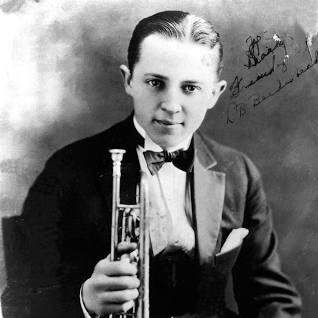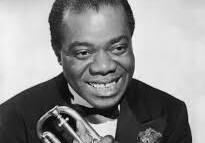Image

by Craig Bennett
BIX AND LOUIS
Generally speaking, people would agree, I’m sure, that the most important influence in shaping a person’s character and determining who he or she becomes is his or her family. The conventional wisdom holds that a stable, two-parent family is the ideal. This produces a mature, honest, responsible, and psychologically healthy individual. But, like most generalities, this one has some occasional exceptions.
Bix Beiderbecke

I recall reading about Bix Beiderbecke, a cornet player who had a lamentably short career as one of the notable pioneers of jazz. Beiderbecke grew up in Davenport, Iowa, the son of conservative Midwestern parents who did not approve of his interest in what was still largely considered “black” music. Bix had talent, however, and persisted in his efforts to learn the new idiom that was rapidly gaining popularity all over the country and beyond. Perhaps to remove him from the easy availability of such music, his parents enrolled him in an exclusive private school in the vicinity—from which he was soon expelled. One of the reasons given was that he had been caught drinking alcohol.
But Beiderbecke found enough opportunities to play in jazz orchestras in the Midwest that he eventually wound up in Chicago. Finally, he left Chicago for New York to play for the famous Paul Whiteman orchestra. For someone still so young, this was an extraordinary affirmation of his talent.
Beiderbecke was by nature something of a gentle, sensitive introvert; but he had a bit of a self-destructive streak. His drinking grew into a full-fledged addiction, and it eventually ruined his health. After only a few years in New York, during which he achieved as much fame and recognition as he possibly could have hoped for while growing up in the Midwest, he returned to Davenport and his parents’ home, sick, defeated, and without much of a future. And then one day, essentially by accident, he came upon something that probably knocked whatever hope he might have had left right out of him.
Stashed away in a closet in a little-used room of his family home were copies of all the records he had made in New York and sent home to his parents. He undoubtedly hoped that they would finally accept his interest in jazz and take pride in the fact that he had become a famous musician whose talent was recognized from coast to coast. But the records were all still wrapped in the packaging in which he had mailed them. They had never even been opened.
I could have wept when I read that. Suddenly, I thought I understood why Bix began drinking. Without much effort, I could imagine what his childhood and youth must have been like. It would probably have turned the average young man into an angry, rebellious adult. But Bix wasn’t made of that material. He was a musician, an artist. He had a gift out of which he fashioned the bulk of his identity, but his own mother and father had subjected it to nothing but relentless condemnation and rejection. And they apparently never understood that to reject his music was to reject not only that identity but their own son himself.
This is one of the saddest stories I’ve ever heard. Yet, it said something significant about family. Beiderbecke had two living parents and a stable home, just as I had when I was growing up. As far as I knew, Bix had not suffered material deprivation, physical abuse, or the insecurity produced by frequent and unpredictable changes in the family’s circumstances. But there was obviously something missing—something very important.
Louis Armstrong

I couldn’t help contrasting Beiderbecke’s experience with that of Louis Armstrong, who was Beiderbecke’s idol when he was young and became one of his closest friends when he ascended to the ranks of the famous. Louis Armstrong was born in New Orleans to a fifteen-year-old prostitute, and his father ran away shortly after his birth. His maternal grandmother, however, provided him with all the affection and encouragement he needed; and he always looked back upon his childhood and youth with unmistakable nostalgia.
There were also the Karnofskys, a humble immigrant Jewish family from Lithuania. Mr. Karnofsky, who dealt in rags and bones for a living, encountered Louis on the streets of New Orleans and took a liking to him. It was Karnofsky who bought Louis his first cornet. As an adult, Armstrong always wore a Star of David to honor the memory of the Karnofskys and always spoke respectfully of their religion. He married young, at the age of twenty, and he and his wife adopted a three-year-old boy who was mentally disabled. His wife was high-strung, temperamental, and prone to violence, and the marriage did not last. It was Louis, however, who took responsibility for the boy for many years after.
Louis Armstrong became not only one of the most famous jazz musicians of his era and beyond, but also one of the best-loved performers of all time. He is universally remembered as a man of both extraordinary musical talent and deep humanity. He came from a poor family and a broken home. He grew up with only one parent, who was not much of a mother. And he had to deal constantly with the rampant prejudice against his race that prevailed in the deep South. It seems almost impossible to comprehend how someone from such a harsh background could have become an adult who displayed not anger and bitterness but kindness, compassion, tolerance, and understanding. When I contrast what I know about Louis Armstrong’s life with what I know about Bix Beiderbecke’s, it becomes even more so.
But Louis Armstrong had something from early on that Bix Beiderbecke apparently lacked: someone who showed him genuine, sincere, and unconditional love. Most of us receive that kind of love from our parents. But obviously, some don’t. If we are among the fortunate who do, we learn that we are worthwhile human beings, worthy of the affection and respect that we experience at the hands of our immediate family. We learn that this is who we are. But if we are among the less fortunate who don’t, we learn from our parents’ anger, criticism, rejection, and abuse that we are unworthy of their affection and acceptance. And we learn that this is who we are.
Parents, love your children… and let them be who they are.
-Craig H. Bennett, author of Nights on the Mountain and More Things in Heaven and Earth